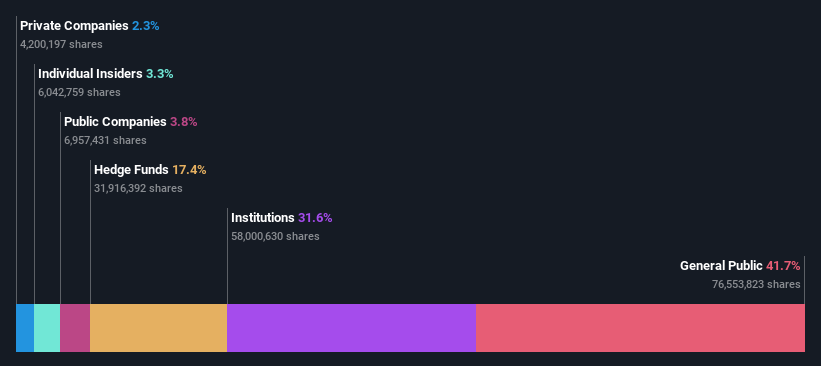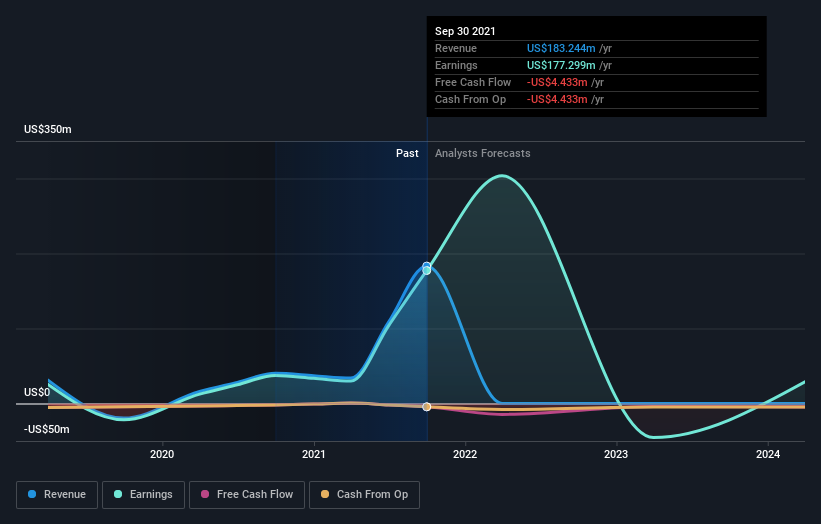- United Kingdom
- /
- Oil and Gas
- /
- AIM:YCA
What Type Of Shareholders Own The Most Number of Yellow Cake plc (LON:YCA) Shares?

The big shareholder groups in Yellow Cake plc (LON:YCA) have power over the company. Institutions will often hold stock in bigger companies, and we expect to see insiders owning a noticeable percentage of the smaller ones. Companies that have been privatized tend to have low insider ownership.
With a market capitalization of UK£639m, Yellow Cake is a decent size, so it is probably on the radar of institutional investors. In the chart below, we can see that institutions own shares in the company. Let's delve deeper into each type of owner, to discover more about Yellow Cake.
See our latest analysis for Yellow Cake

What Does The Institutional Ownership Tell Us About Yellow Cake?
Many institutions measure their performance against an index that approximates the local market. So they usually pay more attention to companies that are included in major indices.
We can see that Yellow Cake does have institutional investors; and they hold a good portion of the company's stock. This implies the analysts working for those institutions have looked at the stock and they like it. But just like anyone else, they could be wrong. If multiple institutions change their view on a stock at the same time, you could see the share price drop fast. It's therefore worth looking at Yellow Cake's earnings history below. Of course, the future is what really matters.

Our data indicates that hedge funds own 17% of Yellow Cake. That catches my attention because hedge funds sometimes try to influence management, or bring about changes that will create near term value for shareholders. MM Asset Management Inc is currently the largest shareholder, with 12% of shares outstanding. Meanwhile, the second and third largest shareholders, hold 5.5% and 5.4%, of the shares outstanding, respectively.
After doing some more digging, we found that the top 12 have the combined ownership of 51% in the company, suggesting that no single shareholder has significant control over the company.
Researching institutional ownership is a good way to gauge and filter a stock's expected performance. The same can be achieved by studying analyst sentiments. There is a little analyst coverage of the stock, but not much. So there is room for it to gain more coverage.
Insider Ownership Of Yellow Cake
The definition of company insiders can be subjective and does vary between jurisdictions. Our data reflects individual insiders, capturing board members at the very least. Company management run the business, but the CEO will answer to the board, even if he or she is a member of it.
Most consider insider ownership a positive because it can indicate the board is well aligned with other shareholders. However, on some occasions too much power is concentrated within this group.
Shareholders would probably be interested to learn that insiders own shares in Yellow Cake plc. In their own names, insiders own UK£21m worth of stock in the UK£639m company. This shows at least some alignment. You can click here to see if those insiders have been buying or selling.
General Public Ownership
With a 42% ownership, the general public, mostly comprising of individual investors, have some degree of sway over Yellow Cake. While this size of ownership may not be enough to sway a policy decision in their favour, they can still make a collective impact on company policies.
Public Company Ownership
It appears to us that public companies own 3.8% of Yellow Cake. We can't be certain but it is quite possible this is a strategic stake. The businesses may be similar, or work together.
Next Steps:
While it is well worth considering the different groups that own a company, there are other factors that are even more important. For instance, we've identified 3 warning signs for Yellow Cake that you should be aware of.
Ultimately the future is most important. You can access this free report on analyst forecasts for the company.
NB: Figures in this article are calculated using data from the last twelve months, which refer to the 12-month period ending on the last date of the month the financial statement is dated. This may not be consistent with full year annual report figures.
New: Manage All Your Stock Portfolios in One Place
We've created the ultimate portfolio companion for stock investors, and it's free.
• Connect an unlimited number of Portfolios and see your total in one currency
• Be alerted to new Warning Signs or Risks via email or mobile
• Track the Fair Value of your stocks
Have feedback on this article? Concerned about the content? Get in touch with us directly. Alternatively, email editorial-team (at) simplywallst.com.
This article by Simply Wall St is general in nature. We provide commentary based on historical data and analyst forecasts only using an unbiased methodology and our articles are not intended to be financial advice. It does not constitute a recommendation to buy or sell any stock, and does not take account of your objectives, or your financial situation. We aim to bring you long-term focused analysis driven by fundamental data. Note that our analysis may not factor in the latest price-sensitive company announcements or qualitative material. Simply Wall St has no position in any stocks mentioned.
About AIM:YCA
Flawless balance sheet with high growth potential.
Market Insights
Community Narratives



